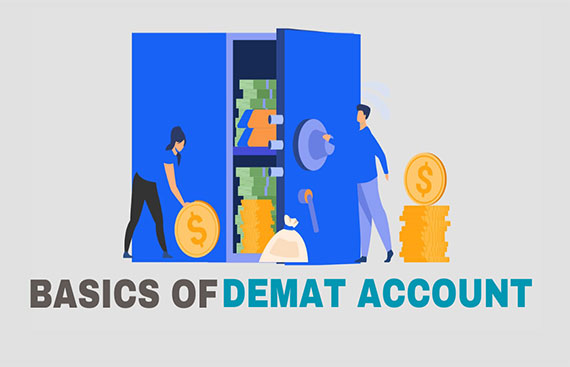Basics of Demat Account

Dematerialization of accounts, or Demat accounts, began in India in 1996. Since the introduction of Demat accounts, India has seen a steady rise in the listing of companies and the participation of investors on stock exchanges. It is mainly due to Indian investors shifting away from traditional investment instruments such as real estate, gold, and FDs that this growth is taking place. Additionally, they are showing more interest in mutual funds, equity investments, derivatives, commodities, currencies, and initial public offerings. But before we dive into Demat accounts, investing, and trading, it's important to understand the basics. So, here are some basics of Demat accounts to get you started.
What is a Demat Account?
A Demat account refers to an electronic method of storing securities. This account allows you to maintain, buy, and sell securities on financial exchanges such as the BSE, NSE, and MCX.
Equities, bonds, mutual funds, IPOs, commodities, derivatives, and exchange-traded funds (ETFs) are all available through a Demat account. National Securities Depository Limited (NSDL), which handles securities traded on the NSE, and Central Depository Securities Limited (CSDL), which acts as a depository for the BSE, are responsible for holding Demat accounts. After understanding the concept of open demat account, lets move to its types.
Types of Demat Accounts
Demat accounts in India can be classified into three types:
- Regular: Regular Demat accounts are available for Indian investors.
- Repatriable: For non-resident Indians (NRIs), a repatriable Demat account is available. This Demat account allows funds to be transferred abroad, but it must be linked to an NRE bank account.
- Non-repatriable: Lastly, there is the non-repatriable Demat account. This Demat account is also used by NRIs, but they cannot transfer funds abroad. An NRO bank account must be linked to this type of Demat account.
Benefits of a Demat Account
In a Demat account, all your securities, such as shares, options, futures, commodities, mutual funds, debentures, ETFs, and bonds, are stored electronically. It's easy to buy, sell, hold, and track your investments from a single window. Demat accounts have several benefits, including:
1. Accessible at all times
With a good Demat account, you can access the market 24x7 from anywhere in the world using any device. Your account can be accessed from any desktop, laptop, tablet or smartphone, so you don't have to be in your office to place a trade, invest or track your portfolio.
2. Liquidity
In financial markets, liquidity is key to trading and investing because you can sell your securities whenever you need funds. With a Demat account, you can buy or sell when the market reopens the next day, unlike physical shares and certificates that are difficult to liquidate quickly. It is easy to place a buy or sell order with a best trading app, and you can get it executed within seconds before any significant price movements take place.
3. Convenience
With a Demat account, you can transact securities quickly and easily. An account that combines Demat and trading is even more convenient because it allows you to trade and invest at the same time. To avoid delays in fulfilling transactions, make sure your Demat and trading accounts are with the same broker. BlinkX can help you trade and invest seamlessly in shares, IPOs, commodities, currencies, derivatives, and mutual funds through their Demat and trading accounts.
4. Speed and Efficiency
In the past, investors had to wait weeks and sometimes months for refunds, interests, and dividends to be credited to their accounts before Demat services became available in India. With Demat accounts, dividends, rights, bonuses, stock splits, and IPOs can be received quickly and easily.
5. Less Risky
Having your securities in electronic form eliminates the risk of theft, damage, and fraud associated with physical certificates. You will also not have to worry about misplacing or losing your assets since they are stored in an electronic format.
The Things You Need to Check Before Opening a Demat Account
A few things should be checked before you open a Demat account with a broker, such as:
- Fees associated with Demat accounts include brokerage fees, annual maintenance fees, and transaction fees.
- The broker's or DP's SEBI registration
- Verify whether the broker or brokerage firm has any pending cases or complaints.
- Find out if your Demat and trading account offers value-added services such as research, insights, and analytics.
Conclusion
With a Demat account, you can access your money 24 hours a day, deliver liquidity, take advantage of ease and speed, and reduce risks. Additionally, choosing a broker, paying fees, complying with regulations, and receiving value-added services are all important considerations when opening a Demat account.
Read More News :
Beyond Emergencies: Creative Ways to Utilise Online Loans for Financial Growth
Rachita Gupta has been appointed as VP of Communications at ONDC



